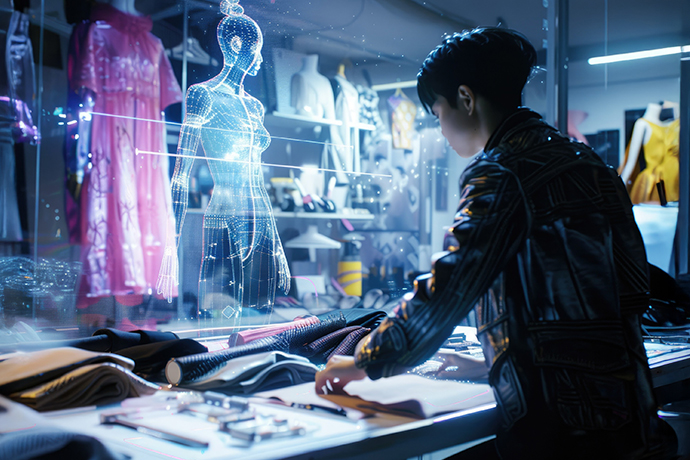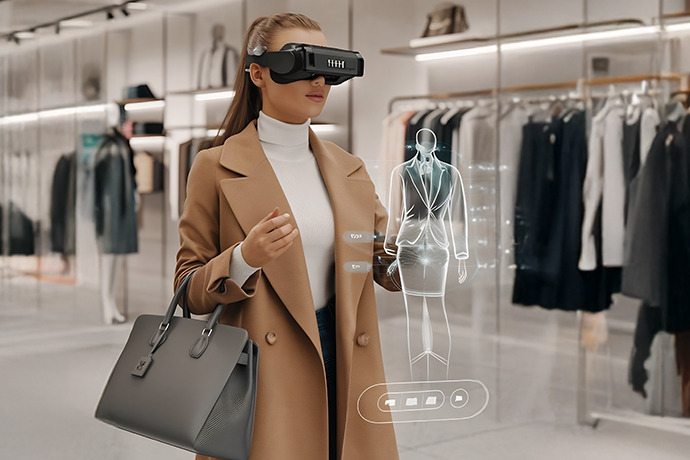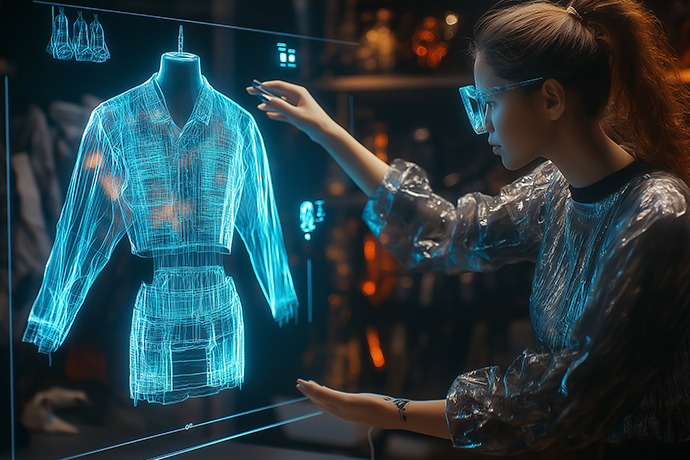 SPEAKERS
SPEAKERS
 TOPICS
TOPICS
Discover how artificial intelligence in the fashion industry is transforming retail and design. Explore innovations and future trends shaping fashion's AI-driven evolution.

In the ever-evolving world of fashion, technology is playing a pivotal role. Fashion is no longer just about creativity; it's also about innovation. The fusion of AI and fashion opens doors to possibilities previously unimaginable. This synergy redefines how fashion is conceptualised, designed, and delivered to consumers. Traditional boundaries are pushed, allowing for a new era of personalised experiences and smart solutions.
AI is reshaping the traditional fashion paradigm by enabling adaptability. With AI's predictive analytics, fashion brands anticipate consumer desires even before they fully form. The artificial intelligence in fashion industry not only thrives on innovation but also champions sustainability. Through resource-efficient practices, AI mirrors fashion's commitment to ethical standards.
One of the greatest innovations in AI in the fashion retail industry is personalised shopping. Retailers can now offer tailored recommendations. Through big data analysis, AI curates personalised clothing suggestions. Every shopper is viewed as unique, creating an exclusive experience that caters to individual tastes and preferences. This has revolutionised the way we think about shopping, bringing a touch of individuality to a previously one-size-fits-all approach.
AI doesn't merely suggest items; it learns your style. By analysing purchase history and online behaviour, it predicts what you'll love next. This bespoke approach in the artificial intelligence in fashion industry has redefined customer loyalty and engagement, turning casual buyers into repeat customers.
Lottie Hulme shares insights on AI crafting personal fashion narratives. AI, to her, is an intimate stylist, refining personal expression. Her experience shows how data-driven insights empower individuals to define unique fashion statements without constraints.

The fast-paced world of AI in fast fashion relies on streamlined operations. AI optimises stock levels by predicting trends. With intelligent algorithms scrutinising sales patterns, retailers maintain the perfect stock balance. This efficiency reduces waste and cuts unnecessary storage costs.
The predictive nature of AI in the fashion retail industry aids in anticipating demand. Inventory challenges diminish as AI coordinates restocks and manages returns smoothly. This way, businesses stay agile and responsive, providing exactly what customers seek.
Moreover, real-time data analysis offers retailers invaluable insights into consumer behaviour. By understanding purchasing trends, AI enables businesses to forecast accurately and plan their inventories accordingly. This level of precision ensures that popular items are always available, while less popular stock is minimised, avoiding markdowns and increasing profitability.

AI is not replacing designers but rather empowering them. Tools powered by AI offer insights into fabric choices and colour predictions. Creativity soars when designers collaborate with AI, exploring vast possibilities in materials and cuts. Fashion becomes an arena of innovation, driven by exciting technological advancements. The use of AI allows designers to experiment more freely, leading to innovative collections that capture the imagination.
Creativity meets science as AI develops imaginative clothing lines. By analysing visual patterns and historical designs, new inspirations emerge. AI supports designers in predicting future trends, aligning creative visions with what will captivate society next. This synergy of AI and fashion pushes boundaries, venturing into styles not yet imagined or attempted. AI assists in visualising concepts digitally, saving time and resources while enhancing the precision and detailing of designing tasks.
Marketing in fashion is evolving with AI's insights. Targeted campaigns cater directly to consumer interests. Social media engagements become more effective when backed by AI analytics. Fashion brands find new ways to captivate audiences, amplifying their reach exponentially. By using AI, brands access a treasure trove of data, allowing them to tailor their messaging effectively and resonate more deeply with the target audience.
Marketing moves beyond guesswork with AI's analytical prowess. Each advertisement serves a strategic purpose, influencing and attracting specific demographics. Insights gained from AI allow for precise segmentation, leading to campaigns that speak directly to consumers' desires and preferences. The transformation through AI in fashion industry fosters meaningful connections between brands and consumers. AI's ability to analyse trends and predict consumer behaviour means brands can stay ahead of the curve, ensuring their marketing strategies are as innovative as the designs they showcase.
Leanne Elliott Young delves into how artificial intelligence in the fashion industry reshapes fashion’s very core. She sees AI not just as a tool but as a voice. Her insights highlight how sustainability aligns with AI’s precision, paving paths for eco-friendly fashion innovations.

AI not only assists in creating trends but also detects emerging fashions. Analysing global trends and market shifts leads to smarter business strategies. AI in fashion industry offers fashion houses the foresight required for avant-garde creations that inspire worldwide admiration. With the power of AI, fashion brands are equipped to not just follow the currents of fashion but to predict them. This predictive capability is invaluable, allowing designers to stay ahead of the curve.
Experimentation evolves dynamically. Historical data on colour usage, cuts, and fabrics inspire fresh trends. Designers are liberated to experiment, adding diversity to their collections with AI-assisted confidence. This freedom encourages bold innovation, with AI providing an analytical backdrop that assures creative risks. The influence of AI extends into the very essence of fashion, unlocking new potential and redefining what’s possible.
Adrienne A. Harris foresees a future where AI defines fashion landscapes. She envisions AI as a creative powerhouse fueling an industry craving change. Her perspectives show AI's integration as a catalyst for design evolution and technological conjunction. Through innovative AI applications, fashion becomes ever more dynamic, open to rewriting traditional norms.
AI and sustainability work hand in hand. Through efficient resource management, AI reduces waste significantly. It calculates optimal resource use, minimising excess. The fashion industry emerges as more sustainable, considering ethical challenges and employing AI for responsible sourcing, manufacturing, and selling. This responsible approach mitigates environmental impact.
Sustainable practices are crucial, and AI ensures environmental consciousness. With intelligent data processing, AI analyses production processes, enhancing ethical fabric utilisation. By identifying opportunities to recycle materials, AI aids in closing the loop. This conscientious approach gives the AI in fashion industry a new label: eco-friendly and progressive. It ultimately advances corporate social responsibility by aligning business goals with sustainability.
The retail experience is personalised with AI-driven tools, enabling brands to connect with consumers on a deeper level. AI can boost conversion rates by offering real-time interaction, ensuring that customer queries are addressed promptly and accurately. By understanding shopper preferences, these advanced systems provide intelligent assistance that not only guides but reassures buyers at every step of the purchasing journey. Customers experience seamless journeys, effectively transforming browsing into buying with remarkable ease.
Online visibility, a cornerstone of modern retail, thrives when AI fine-tunes conversion methods. Real-time solutions tailor experiences, offering suggestions and recommendations based on intricate data analysis. This personalisation ensures a shopping environment where consumer needs are anticipated and met proactively.
Furthermore, AI analyses vast amounts of data to predict purchasing patterns, making stock replenishment more efficient. Retailers who leverage these tools benefit from increased sales and customer retention, setting a new benchmark in the competitive landscape of fashion retail. By strategically utilising AI, businesses can navigate market dynamics effortlessly, solidifying their position at the forefront of the industry.
AI speakers always underline that as artificial intelligence continues to permeate every layer of the fashion ecosystem, from design studios to checkout pages, its influence grows ever more profound. What began as a tool for operational efficiency has now become an engine for creativity, sustainability, and deeper consumer connection. The integration of AI isn’t a trend—it’s a paradigm shift that’s rewriting the rules of the fashion industry. From independent designers to global fashion giants, those who embrace this technology are not just adapting—they're leading the way forward.
Allison Duettmann argues that AI shapes visions beyond imagination. Her expertise highlights how the community inspires. Fashion becomes more adaptive, futuristic, and inclusive by embracing intelligent technology. This transformation is not just about the implementation of new tools; it represents a holistic approach where AI fosters an environment ripe for creativity and innovation. Duettmann emphasises that the synchronisation between AI and fashion paves the way for novel approaches.
It’s a good idea to engage with fashion speakers to gain more insights on how the scope of this dynamic industry is redefined. AI empowers creativity, precision, and sustainability, reinforcing a future teeming with potential and promise. This alliance fosters a vibrant, resilient industry that is constantly evolving.